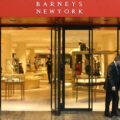ABOVE PHOTO: Mark Lee, CEO of Barneys New York, addresses members of the media with The Rev. Al Sharpton, right, Tuesday, Oct. 29, 2013, at the National Action Headquarters in New York, after discussing allegations of racial profiling after customers were arrested outside the store after making legal purchases.
(AP Photo/Craig Ruttle)
By Jess Washington
associated press
The usual scenario involves suspicious glances, inattentive clerks or rude service – not handcuffs.
Yet when a black teen said he was wrongly jailed after buying a $350 belt at a Manhattan luxury store, it struck a nerve in African-Americans accustomed to finding that their money is not necessarily as good as everyone else’s. Shopping while black, they say, can be a humiliating experience.
Much attention has been paid to the issue over the years – Oprah Winfrey complained that a Swiss clerk did not think she could afford a $38,000 handbag, and even President Barack Obama has said he was once followed in stores. But according to shoppers interviewed Monday, many people don’t recognize how prevalent retail discrimination is, and how the consistent stream of small insults adds up to a large problem.
“It’s one thing if you don’t understand. But don’t ever tell me it doesn’t happen to me,” said Natasha Eubanks, who shops often at high-end stores in New York City. “You can’t assume it doesn’t happen just because it doesn’t happen to you.”
Sometimes, Eubanks said, it takes clerks more than five minutes to simply acknowledge her presence. Or they brush her off after a token greeting. Or they ask her question after question: “You’re a black girl up in Chanel. They want to know what you’re doing here, and what you do for a living.”
She says she has dealt with this type of treatment at least 20 times in New York City.
“I don’t look like that typical chick who walks into that type of store,” said Eubanks, owner of the celebrity website theYBF.com. “It feels differently than when you go into a store and are treated properly.”
Trayon Christian’s problem was not how he was treated when he went into Barneys New York – it was what happened afterward. In a lawsuit filed last week, the 19-year-old said that he bought a Ferragamo belt at the Manhattan store, and when he left he was accosted by undercover city police officers.
According to the lawsuit, police said Christian “could not afford to make such an expensive purchase.” He was arrested and detained, though he showed police the receipt, the debit card he used and identification, the lawsuit said.
After Christian’s lawsuit was filed, another black Barneys shopper said she was accused of fraud after purchasing a $2,500 handbag, and the black actor Robert Brown said he was paraded through Macy’s in handcuffs and detained for an hour after being falsely accused of credit card fraud.
For Yvonne Chan, the reports were a painful reminder of when she worked in a liquor store in a predominantly white Massachusetts town. Every few months someone would be caught stealing, and about half the time it was a black person.
“You find yourself watching black people. (The stealing) only happens once in a while, but it changes your perception,” Chan said.
Chan, a graduate student, always tried to remind herself not to act on stereotypes, but, “Like it or not, I’m going to have a preconceived notion of races from my experiences. As much as I would like to force my brain not to think like that and put everyone on an even playing field, stereotypes play a role in our society … we skew the view of people as individuals.”
Those skewed views can affect who gets arrested for retail theft, said Jerome Williams, a business professor at Rutgers University who has studied marketplace discrimination.
Many people justify racial profiling by saying that black customers are more likely to steal. But one study has shown that white women in their 40s engaged in more shoplifting than other demographic groups, Williams said.
“The reason they don’t show up in crime statistics is because people aren’t watching them,” said Williams.
Statistics showing that black customers steal more “are not really an indication of who’s shoplifting,” he said. “It’s a reflection of who’s getting caught. That’s a reflection of who’s getting watched. It becomes a self-fulfilling prophecy.”
Dido Kanyandekwe knows he is being watched. “But I joke with them; I see them looking at me and I say, `Hello, I see you!’ And I wave,” said the 18-year-old college student in New York City, who was in Barneys on Monday buying a $600-plus pair of Italian designer sneakers.
“Most black people don’t have the money to buy stuff at Barneys,” said Kanyandekwe, the son of wealthy parents, before paying for the black leather shoes with a credit card. “But that does not mean all black people are not able to buy these things.”
Black people are not the only ones who can face unequal treatment in stores. Hispanics have made the same complaints. And Sher Graham, a white woman who lives in Mobile, Ala., says black servers in the fast-food restaurants she visits often wait on black customers first.
A few months ago, she said, a black cashier started talking to black women standing in line behind her about their order. “When I brought this to her attention, she just shrugged her shoulders and completely ignored me. This action happens more times than not here in the Gulf Coast region,” Graham, a consultant and speaker, said in an email interview.
Yet if the number of complaints is any guide, the experience is most common for African-Americans.
Candace Witherspoon, a wardrobe stylist in Los Angeles, went to a store in Century City last April to buy a purse and shop for one of her celebrity clients. She was wearing a T-shirt and jeans. In a letter to the company, Witherspoon said the sales associate barely greeted her, then ignored her, in contrast with her treatment of white patrons.
“As the other customers left, she said `Thanks ladies for shopping. Have a good day.’ When I left she gave me a nasty look and didn’t say anything,” Witherspoon’s letter said.
Toni Duclottni, who runs a fashion web site in Los Angeles, recently went to a Beverly Hills department store intending to spend about $4,000 on shoes. But she took her business elsewhere after being ignored.
“It’s frustrating to be constantly ignored and people pretend it doesn’t happen,” she said.
To her, the solution is simple.
“They rush to judgment, they jump into it assuming something without speaking to a person,” Duclottni said. “They’d be surprised if they just walked up and said, “Hello, can I help you find something?’ They’d be surprised.”
Sharpton, Barneys NY CEO discuss racial profiling
By Karen Matthews
associated press
NEW YORK — Civil rights activist Al Sharpton said he and other community leaders had “a very candid” meeting with the CEO of Barneys New York on Tuesday to discuss allegations of racial profiling at the high-end retailer.
Two black customers accused the luxury store of racial profiling last week after they said they were detained by police on suspicion of credit card fraud after lawfully purchasing expensive items.
“We had a very candid and open meeting today to begin a dialogue,” Sharpton said after the private meeting with Barneys CEO Mark Lee at Sharpton’s National Action Network office in Harlem.
Lee said Barney’s own initial investigation showed no employees were involved in the two incidents, but that the retailer wanted to be part of the solution to racial profiling in stores.
One of the shoppers has filed a discrimination lawsuit against Barneys, the city and its police department, while the other has filed a complaint with the city’s police watchdog agency.
Also attending Tuesday’s meeting were Hazel Dukes, president of the New York chapter of the NAACP, former Gov. David Paterson, other civil rights leaders, pastors and elected officials.
Macy’s flagship Manhattan store has also been hit with a claim from a black actor that he was stopped because of his race while shopping. Macy’s didn’t comment on the litigation but said in a statement it was investigating.
The New York Attorney General’s Office has sent letters to the executives at both Barneys New York and Macy’s East, citing allegations the stores profile customers based on race and national origin and stating that was prohibited under state and local civil rights law.
“We offer our deepest sympathies’ to the two alleged profiling victims, said Lee, adding that the retailer “has a policy of zero tolerance for discrimination in any form.”
He said Barney’s would “cooperate fully” with the state attorney general.

















Leave a Comment